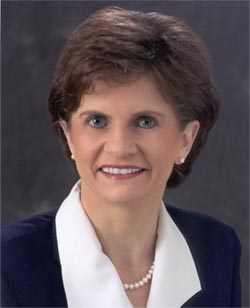
Amy Tuck is an American attorney and politician who served as the 30th Lieutenant Governor of Mississippi from 2000 to 2008. A member of the Republican Party, she was previously a member of the Mississippi State Senate. She is the second woman to be elected to statewide office in Mississippi, and the first to have been reelected.

Thomas Howell Cobb was an American political figure. A southern Democrat, Cobb was a five-term member of the United States House of Representatives and Speaker of the House from 1849 to 1851. He also served as the 40th Governor of Georgia (1851–1853) and as a Secretary of the Treasury under President James Buchanan (1857–1860).
George Robert Hightower was born at Smith's Mills, in Grenada County, Mississippi, October 15, 1865, a son of George Hightower, Jr., and Fannie (Kirby) Hightower.
DTN/The Progressive Farmer is a country life oriented magazine, published twelve times a year by DTN, a division of Telvent. The magazine is based in Birmingham, Alabama.

Mississippi State Bulldogs is the name given to the athletic teams of Mississippi State University, in Starkville, Mississippi. The university is a founding member of the Southeastern Conference and competes in NCAA Division I.
William Bell Montgomery was an American farmer, businessman, and editor of farming periodicals.
Dr. Lisa A. Rossbacher, is the president emerita of Southern Polytechnic State University and the current President of Humboldt State University. She served as president of Southern Polytechnic State University from August 1998 to June 30, 2014. A geologist, writer, professor, former Vice Chancellor of the University System of Georgia, and community leader, she is also a past Chair of Metro Atlanta's Cobb Chamber of Commerce, an author of several books on geology, and a Geotimes Magazine columnist.

Mark Everett Keenum is an agricultural economist in the United States. He is currently the president of Mississippi State University.
Roy Vernon Scott is a Professor Emeritus of history at Mississippi State University in Starkville, Mississippi, who specialized in agricultural and railroad studies in the American South and Midwest. In 1997, he co-authored Wal-Mart: A History of Sam Walton's Retail Phenomenon, a study of Sam Walton's Wal-Mart retail giant.
Jimmy Gayle Shoalmire was an historian of the American South originally from Shreveport, Louisiana, who specialized in Reconstruction and agricultural studies.
James L. "Jim" McCorkle Jr., was a professor of history at Northwestern State University in Natchitoches, Louisiana, who specialized in research on the American South, particularly agriculture. He was an NSU faculty member from 1966 until 2003.

Bully is the official mascot of the Mississippi State University Bulldogs in Starkville, Mississippi, and the name is given to both the costumed mascot and the live bulldog that appears at State games. The live mascot Bully is an American Kennel Club registered English Bulldog, and each dog is given the inherited title of "Bully". The name "Bully" is traditionally considered a title and not the official name of the specific dog that holds it.

Mildred Lewis "Miss Millie" Rutherford was a prominent educator and author from Athens, Georgia. She served the Lucy Cobb Institute, as its head and in other capacities, for over forty years, and oversaw the addition of the Seney-Stovall Chapel to the school. Heavily involved in many organizations, she became the historian general of the United Daughters of the Confederacy (UDC), and a speech given for the UDC was the first by a woman to be recorded in the Congressional Record. She was a prolific non-fiction writer. Also known for her oratory, Rutherford was distinctive in dressing as a southern belle for her speeches. She held strong pro-Confederacy, proslavery views and opposed women's suffrage.
William Lincoln Giles was president of Mississippi State University from 1966–1976.
William Hall Smith was the President of the Mississippi Agricultural and Mechanical College, now Mississippi State University, from 1916 to 1920. Smith was born near Vernon in Lamar County, Alabama. He was a member of the first Board of Trustees of Mississippi Normal College, now known as the University of Southern Mississippi, and was elected first president of that institution during the period of its construction. Smith Hall at Mississippi State was formerly named in his honor.
Buz M. Walker was a mathematics professor and the President of the Mississippi Agricultural and Mechanical College from 1925 to 1930. The Walker Engineering building at Mississippi State is named in his honor. He was an instructor at the school from 1883 to 1884, an assistant professor of mathematics from 1888 to 1927, and the dean of the engineering school from 1922 to 1925, and vice president of the university from 1913 to 1925. He was also into the school's athletics, a regular member of the Southern Intercollegiate Athletic Association, and its president around the time of World War I.
















